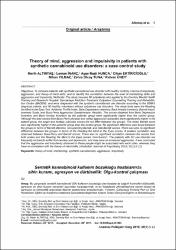Theory of mind, aggression and impulsivity in patients with synthetic cannabinoid use disorders: a case-control study

View/
Date
2019Author
Altıntaş, Merihİnanç, Leman
Hunca, Ayse Nazli
Ektiricioğlu, Cihan
Yılmaz, Nihan
Tuna, Zehra Olcay
Üney, Rıdvan
Metadata
Show full item recordAbstract
Objective: To compare patients with synthetic cannabinoid use disorder with healthy controls in terms of impulsivity, aggression, and theory-of-mind skills, and to identify the correlation between the level of mentalizing skills and aggression and impulsivity. Methods: The study included 80 outpatients who applied to the Erenkoy Mental Health Training and Research Hospital, Sancaktepe Addiction Treatment Outpatient Counselling Training and Rehabilitation Centre (BADEM), and were diagnosed with the synthetic cannabinoid use disorder according to the DSM-5 diagnosis criteria, and 50 healthy volunteers without substance use disorders. The study tools were the Reading the Mind in the Eyes Test, Addiction Profile Index, Beck Depression Inventory, Beck Anxiety Inventory, Barratt Impulsiveness Scale, and Buss-Perry Aggression Questionnaire. Results: The scores obtained from Beck Depression Inventory and Beck Anxiety Inventory by the patients' group were significantly higher than the control group. Although the total scores from Buss-Perry physical and verbal aggression subscales were significantly higher in the patient group, the anger and hostility subscale scores did not differ between the groups. The motor Barratt score was significantly higher in the patients' group than the control group. No significant difference was found between the groups in terms of Barratt attention, non-planning Barratt, and total Barratt scores. There was also no significant difference between the groups in terms of the Reading the Mind in the Eyes scores. A positive correlation was observed between Buss-Perry and Barratt scores. There was no significant correlation between the scores from both scales and the Reading the Mind in the Eyes scores. Conclusion: The patients with SC use disorder are frequently inclined to suffer from anxiety and depression, and may have an increased aggression. It was concluded that the aggression and impulsivity observed in those people might be associated with each other, whereas they have no correlation with the theory-of-mind skills.

















